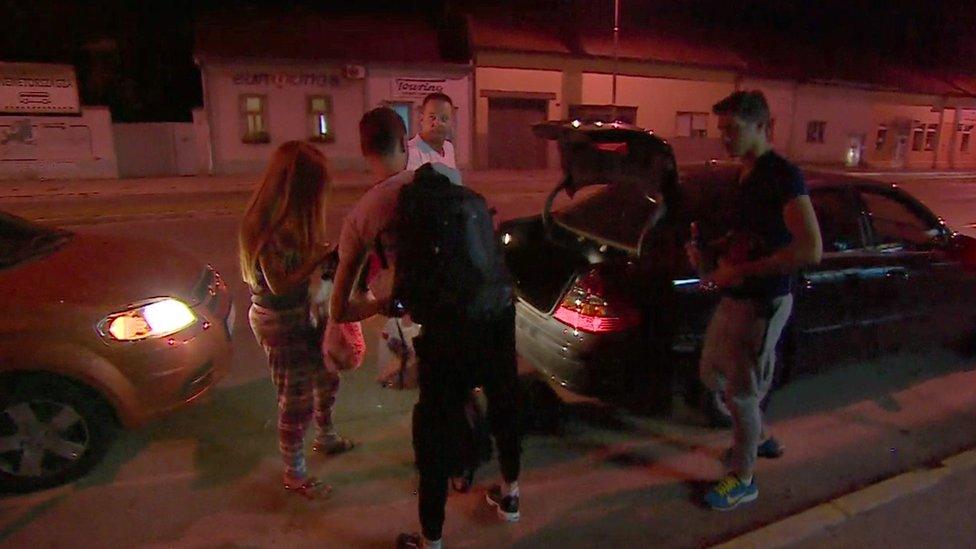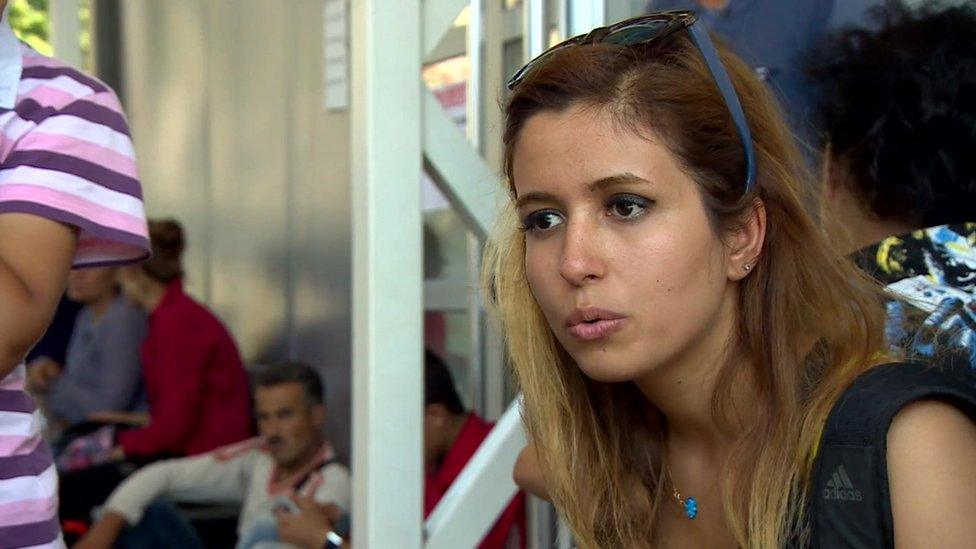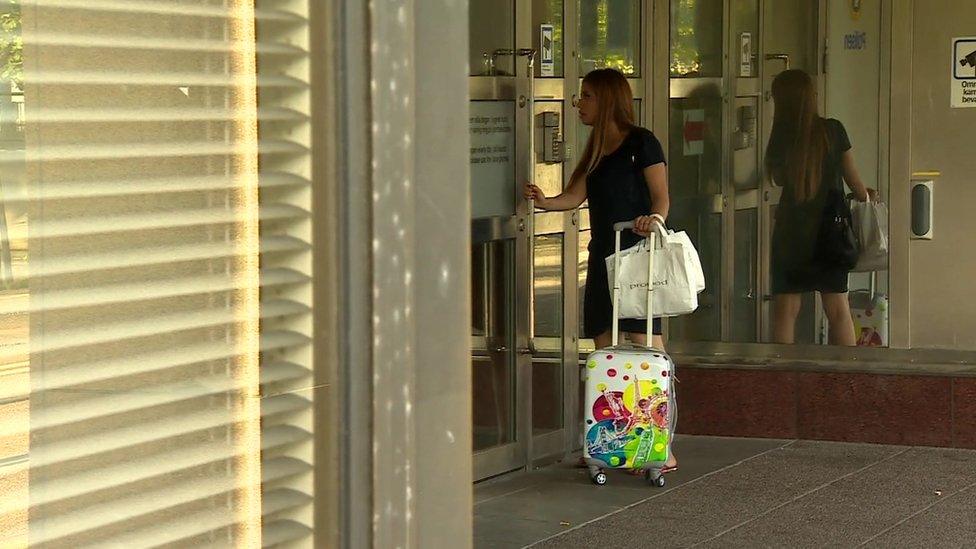From Turkey to Sweden: Syrian migrant's perilous journey
- Published
A Syrian migrant called Nour travels through nine countries to try and fulfil her dream of applying for asylum in Sweden
The BBC's James Reynolds follows the progress of a young Syrian migrant, as she makes a perilous journey from Turkey to Sweden to claim asylum.
"I don't want to be Syrian anymore," says 20-year-old Nour Ammar. "Everything is hard for Syrian people. That's why I decided I needed to go. I'm supposed to go. I don't have any choice."
Nour and her mother, Islam, fled Deir al-Zour in Syria three years ago. Her father, who stayed behind, was killed shortly afterwards. She and her mother eventually moved to exile in Turkey.
For two years in Istanbul, she enjoyed a comfortable life. Nour found work in a hair transplant salon, and later with Turkish state TV. She learnt Turkish, went horse-riding and dyed her hair blonde for the summer.
But she wanted to start a new life away from the region. She aimed to make it to the Swedish city of Gothenburg where her brother lives with his young family. There, she would apply for political asylum.
'Doctor and Devil'
Nour planned to follow the increasingly familiar migrant trail from the Turkish coast to northern Europe.

In Serbia, desperate to avoid detection, Nour and her friends pay a driver €300 (£220; $340) to drop them 16km (10 miles) from the Hungary border - they find the rest of their way on foot
Istanbul to Gothenburg by boat and by land is a 2,500-mile (4,020km) trip. A Facebook group for Syrians shares advice on prices and routes. Istanbul-Gothenburg, including smugglers' fees, costs about €3,000 (£2,200; $3,780).
On the early morning of 15 August, Nour's mother took her to Istanbul airport for the short flight to the coast. Just before boarding, her mother began to panic.
"She caught me by the hand and said: 'Come back. Don't go.'
"I said: 'Mum, don't be crazy!'
"I was crying, and throughout the trip I remembered [the expression on her face]."
In the Turkish coastal city of Izmir, Nour met up with five Syrian friends - one of whom is nicknamed "The Doctor" and another one whom she called "Devil".
They paid smugglers $1,200 each for the 10-mile boat journey to the Greek island of Agathonisi.
"We were 48 people inside," Nour said. "We spent three hours in the sea. It was very difficult. [The smugglers] taught one person to steer the boat. But he didn't know how to use it and it broke in the middle of the sea.
But the boat made it to Greece. Exhausted, the friends took Greek boats to the island of Samos, then to Athens. They made their way overland to the border with Macedonia. During their trip, hotels turned them away.

Nour fled Deir al-Zour in Syria for Istanbul three years ago - her 2,500 mile journey to Sweden took two weeks and 13 hours
"We slept in the streets for two-three days," said Nour. "It's very bad actually. No-one respects Syrian people - it's like we're diseased or something."
The group took a bus from Macedonia into the Serbian border town of Presevo, which is crowded with new arrivals.
"We are very tired," Nour said, "very sick, all of us."
Nour decided not to join the crowd of refugees waiting to register for Macedonian travel papers. She was desperate not to be stopped and fingerprinted on her way to Sweden.
In theory, you have to stop and apply for asylum in the country which first registers you. This rule is not always enforced, but many refugees refuse to take the risk and do whatever they can to avoid being fingerprinted.
The rules governing immigration to the EU - explained in 90 seconds
'Like a dream'
From Presevo, Nour's group took the bus north to the Serbian capital, Belgrade, where they found a place to stay in a run-down area.
It was the eve of their attempt to cross into Hungary, the start of the EU's Schengen area - its border-free zone.
"If we pass safe - that's fantastic," she said late at night by phone. "It would be a disaster to be fingerprinted."
At dusk the next day, hundreds of migrants and refugees walked along train tracks into Hungary to be met and registered by the Hungarian police. But Nour and her group did not want to be spotted. They paid a driver €300 to drop them 10 miles from the Hungary border.
"Actually I'm very afraid," she says at that point; "if we're passing safe, we are safe."
The group picked up their bags. They walked for hours at night and crossed the border along a deserted track. By this time, most members of the group were ill.
But entering the EU's single border area did not end their worries. Nour's group found an apartment, where she collapsed with a fever. The police came round to demand €50 bribes not to take them in. For two days, Nour was too sick and too scared to make phone calls.

It took Nour more than two weeks to get from Istanbul in Turkey to Gothenburg in Sweden
After she got better, she reached the Austrian capital, Vienna.
Her friends (including "Devil") carried on to Germany - from where they happily texted her pictures of the good food they were finally able to eat.
Nour headed alone towards her final stop - Gothenburg. Even at this stage, well inside Europe, she was afraid of police checks on board the train. She would only be able to relax once she crossed her final border.
But the frontier between Denmark and Sweden lies in the middle of the Oresund strait. It is almost entirely unmarked. The train proceeded along the bridge between the two countries.
Gustav, an 18-year-old Swedish student - sitting across the aisle - looked at his phone.
"It's switched to a Swedish carrier," he said casually. "That means we're in Sweden."
"Finally!" Nour said, with a smile. "It's like a dream. All the way when I was looking through the window, I said: 'Where am I? Is it true? Am I going to Sweden?'"
Getting plea right
She sent a message to her mother on WhatsApp to tell her she had made it. Her phone soon rang. Her mother was calling just to make sure.

Final destination: Nour enters a police station in Gothenburg to claim asylum
"She didn't believe I was in Sweden. She said: 'Are you sure you're in Sweden?'"
At 18:20, two weeks and 13 hours after she began her journey from Istanbul, the train pulled into Gothenburg's main station.
Nour was finally able to declare herself to the country of her choice. She wanted to get the opening words of her asylum plea exactly right. Her brother sent her the text of what she should say to the police.
She repeated those words again and again to herself as she walked towards the nearest police station. She pressed the intercom and went inside.
"Hello, I am a Syrian refugee. I would like to apply for asylum in Sweden."